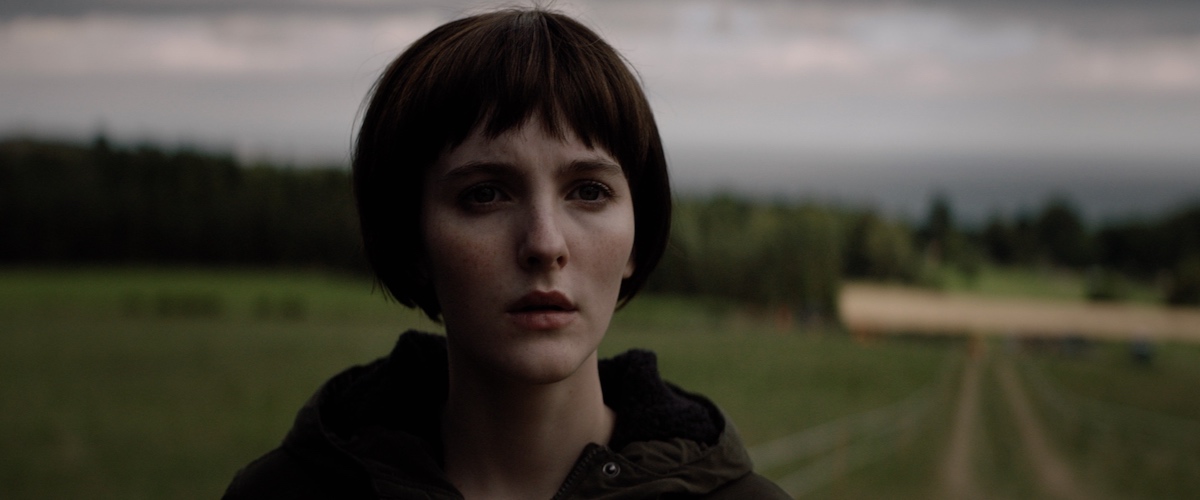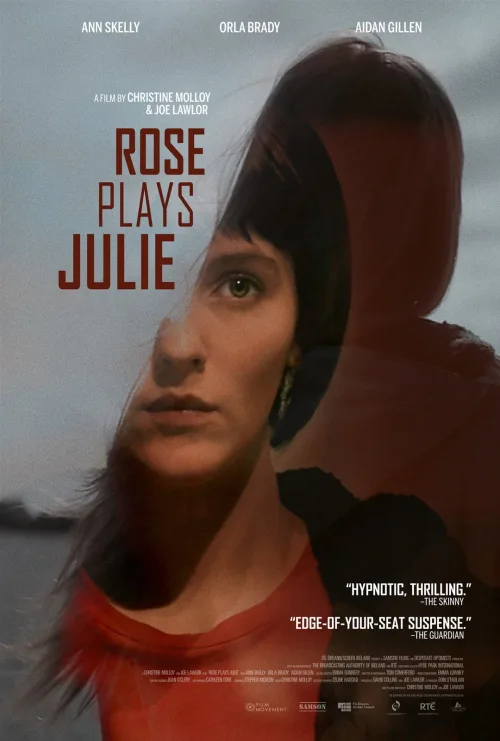The silences in “Rose Plays Julie” border on unnerving, especially when placed up against loud clanging doors, the crunch of car wheels on gravel, any sound at all. There’s something very eerie about “Rose Plays Julie,” and the eeriness is not just a style choice to create a mood. It’s an accurate depiction of the dissociative states of the three main characters, who move through their worlds like somnambulists, compartmentalizing ugliness where they never have to look at it, and yet ugly is running the show. It is Rose (Ann Skelly) who decides to face the ugly, name it, bring it out of the shadows, and therefore break the spell. The tale, crafted by co-writers/directors Christine Molloy and Joe Lawlor, taps into primal urges—for love, revenge, knowledge—and these urges give “Rose Plays Julie” a mythic quality, like a story told since antiquity, or a fable designed to express truths about the human condition. “Rose Plays Julie” is very controlled in its style: this control reaps huge rewards.
Rose is a veterinary student at a Dublin university, and in the midst of an identity crisis. Literally. When she was adopted as a child, she was given the name Rose, but “Julie” appears on her birth certificate. “Julie” is a whispered echo of the birth mother she’s never known. Rose says in voiceover, “I like the name Julie. When I think about Julie, I picture her like me. But different.” Maybe Julie was who she was supposed to be all along. Maybe if she tries to “enter” Julie, she will be closer to the life she should have lived. Rose has tracked down her birth mother, a London-based actress named Ellen (Orla Brady). The urge for contact is overwhelming, and Rose travels to London, where she poses as a potential buyer for Ellen’s home, and in so doing meets meets Eva, Ellen’s teenage daughter. Eva has no idea that the tremblingly vulnerable woman asking her questions is her half-sister. Rose then tracks Ellen down to a movie set, peeking out at her from behind a nearby building. Whatever Rose’s endgame is, it’s a little bit more ambiguous than just “getting in touch.”
When Ellen and Rose finally come face to face for the first time, Ellen, in great distress, tells Rose the circumstances of her pregnancy, as well as why she felt she had to give Rose/Julie away. It’s a harrowing tale, but the klieg-light of Rose’s almost frozen gaze turns from Ellen to her biological father. Now she must track him down, for very different reasons. Her father, an archaeologist named Peter (Aiden Gillen) is easily found, overseeing a dig out in the countryside. Rose puts on a pixie-ish, Louise Brooks-style wig, and approaches him asking if she can volunteer on the dig. She gives her name as “Julie.”
As the title expresses, “Rose Plays Julie” is a film about the disguises we wear either by choice or unconsciously, the identities we choose to present to the world, as opposed to who we are when we’re alone behind closed doors. Masks serve multiple purposes. They can conceal the truth. They also reveal the truth. When Rose puts on the wig and “plays” Julie, she can express herself for the first time. She’s like Sleeping Beauty coming out of a trance. For Ellen, disguises are the tricks of her actress trade. Ellen is seen wearing various costumes throughout, a red nun’s habit with white wimple, an 18th-century gown, a contemporary police officer’s uniform. But there are other disguises she’s used, invisible ones she’s used to get through her life. Peter’s disguise is the most damaging, and the most necessary (for him). He hides in plain sight. No one would guess.
This potent modern tale is told in stark fashion, where familiar everyday interiors—classrooms, dorm rooms, airports—seem strange and “other,” often dimly lit, with lots of windows showing no life beyond, almost like the interiors have no real substance. It’s hard to imagine people just hanging out and talking and having fun in any of the interiors in the film. The sound is extremely controlled, with silence dominating. Tom Comerford’s cinematography highlights the strangeness of these spaces, the barely inhabited college campus, the generic quality of Ellen’s house, the shadowy expanse of Rose’s dorm room. This is not a realistic world. Stephen McKeon’s very dramatic score, complete with creepy-sounding sopranos, is used sparingly, and to great effect.
“Rose Plays Julie” is a simple tale, really, but the emotions are enormous and fraught, calling up comparisons to Aeschylus’ The Oresteia, or, Sophocles’ Electra, where Electra, Agamemnon, and Clytemnestra, bound together by family ties, march towards horrible climaxes of action and counter-reaction, following the demands of fate and destiny. When a deer falls into the archaeological dig and has to be “put down,” Peter’s anguish is the most intriguing thing about him, connecting him to the biological daughter he doesn’t even know he has, whom we saw in an early scene shedding a tear during a euthanasia procedure in her veterinary program. Father and daughter are already magnets.
“Rose Plays Julie” is a sparsely populated film, giving the impression that Rose, Ellen, and Peter are charging towards one another on a vast and empty battlefield. Skelly is both beautifully expressive—her eyes and voice drawing you in—and very hard to read. Something is frozen in Rose, it’s like she’s screaming for help from the bottom of a well. (There is one moment where she screams something and the sound drops out. You only hear later what it was she said.) Why she didn’t just write Ellen an email requesting they meet for coffee is one of Rose’s mysteries: Rose is led deeper and deeper into the fairy tale forest (the first conversation with her mother takes place at the edge of a forest), as she is pulled towards Peter by an irresistible force. Ellen feels that force, too. Brady is excellent as Ellen, a woman who turned her back on her past, shoving it into a closet where she never had to look at it again. When Rose shows up in her life unannounced, Brady’s face flickers with a potent mix of uneasiness and terror, but there’s calmness there too. Part of her, a secret part, always knew this day would come.
The film wouldn’t work if Peter was played as a one-note villain. It would be so much easier in real life if villains announced their villainy with mustache-twirling behavior, but unfortunately, villains often take on pleasing disguises. Gillen, a superb actor, gives us Peter as an ever-shifting kaleidoscope. He is tricky; you can’t nail him down. His masks are so multiple you wonder he can keep track of them. Gillen masterfully flows between charming, reckless, broken, predatory, pathetic, and frightening. When father and daughter finally come face to face, you don’t know which one is in more danger. Rose seems capable of anything by that point, and Peter is a wolf in sheep’s clothing. Peter’s famous archaeology text is called Below the Surface (the irony of the title so sharp it tips over into cynicism).
They say revenge is a dish best served cold. They also say revenge is sweet. “Rose Plays Julie” doesn’t have a “sweet” bone in its body: the emotions are too painful and contradictory to be called “sweet.” But “Rose Plays Julie” knows in its bones, and revels in the fact, that there is nothing so scrumptious, so heavenly, as a dish gone icy, icy cold.




















